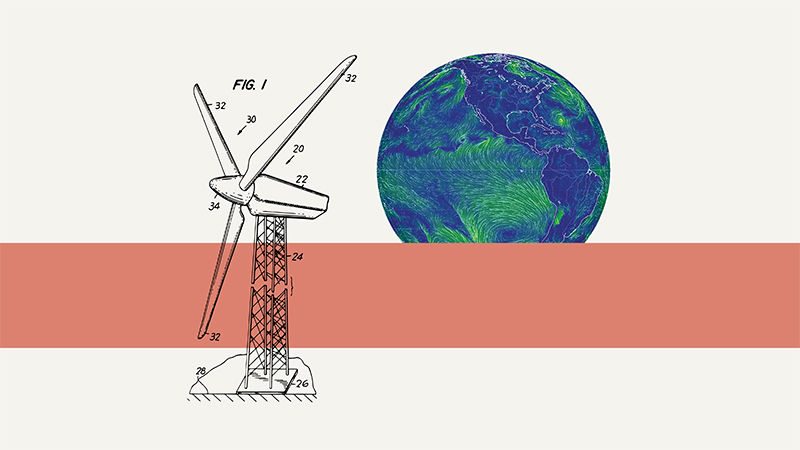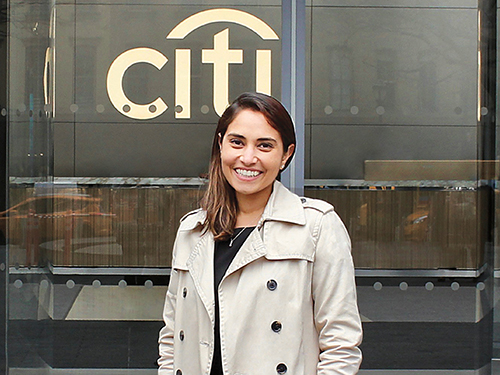
By Bethany Romano, MBA'17
Pallavee Panchal, MBA/MA SID'16, never thought she'd be back working in a Wall Street bank.
Her decision to return to the corporate sector was driven by the potential to have a huge social and environmental impact. Today, she’s the assistant vice president of corporate sustainability for Citi, the 200-year-old multinational banking and financial services company.
“When I graduated college, my first job was on the operations team at Goldman Sachs,” she says. Though challenged in finance, she wanted to follow her passions, and after three years, she left to serve in the Peace Corps in Indonesia, then obtained dual master’s degrees from the Heller School. So far, she’s held jobs in nonprofits, for-profits and philanthropic organizations. “I believe in trying everything once. Every single experience teaches you something about yourself, your work ethic and your resiliency.”
So, what does her work on Citi’s corporate sustainability team entail? Essentially, her team coordinates with various parts of Citi and its clients and partners to understand the opportunities and risks around environmental and social sustainability. This work is guided by Citi’s Sustainable Progress Strategy, which organizes goals and activities into three pillars: environmental and social risk management, environmental finance, and operations and supply chain.
For risk management, Panchal’s team works alongside other groups within Citi to examine environmental, social and human rights in Citi’s business practices, setting high standards for the bank itself and leveraging client relationships to impose those standards on others. “We’re constantly working to make sure our policies — whether they’re social, human rights-based or environmental — don’t just align with national and international standards; we go beyond that,” she says.
The second area focuses on Citi’s flagship initiative: the $100 Billion Environmental Finance Goal. This initiative aims to finance and facilitate $100 billion in activities that reduce the impacts of climate change and create environmental solutions that benefit people and communities. Panchal’s work focuses a lot on this goal, from tracking transactions and reporting progress to working hand in glove with the bankers on accounting for these environmental activities.

The last area of sustainability activities — operations and supply chain — seeks to reduce Citi’s environmental footprint and reflect best practices across its supply chain. Citi has committed to sourcing renewable energy for all of its energy needs by 2020. In at least one instance, Panchal’s team worked with bankers and the communications team to link Citi’s environmental finance activities with their operations goals: first they provided financing for a wind-farm project in Texas, and then they purchased the power generated by that wind farm to achieve Citi’s goal of contracting 100 percent renewable energy in the region by 2020.
For Panchal, a job like this requires a few key ingredients to be truly successful, and mission is paramount among them. “Citi’s mission is to enable growth and economic progress,” she says. “Every single part of the bank, from the finance side to the banking side, operations, all of it: Everyone’s always looking at how to push that mission. I’ve never met people who are so passionate, except when I was at Heller.”
With a strong mission and passionate people on her side, Panchal revels in the capacity — and responsibility — for making a significant impact. Within Citi, the Corporate Sustainability team sits under Citizenship, and largely Global Public Affairs. As part of her function, she counts the number of people she can influence at Citi in the hundreds of thousands. “There are over 200,000 employees, and even more customers globally. My voice is so much louder in this position than at any other place I’ve worked. I continually ask myself, how can we challenge ourselves now?”
Panchal loves her work at Citi and emphasizes that she feels very lucky to have found the “unicorn” job. “Getting this job is 90 percent luck and 10 percent incredibly hard work, but these types of jobs are very few and far between. Before this, I searched for a very long time for the job that fit best. I could have stayed in nonprofits forever, but my skills and background were perfectly suited for this challenge.”
Ravi Lakshmikanthan, MA SID’99, Heller’s assistant dean of academic and student services, remembers that moment, too. “She always worked so hard and had such positive energy. I knew she’d reach her goals, no matter the path. Last spring, I received an email from Pallavee with the subject line ‘Big News!’ telling me about her new role at Citi, and I wasn’t surprised at all, just happy for her to start her dream job.”
Panchal, who was a Teigh Blume Brown Fellow at Heller, credits her unique dual master’s degrees — an MBA and an MA in Sustainable International Development (SID) — with her ability to navigate the business and environmental worlds simultaneously. When she was applying to grad school, she considered both MBA programs and sustainable development programs. Heller was the only school that would allow her to combine both of these key interests at the same time.
“And I really did combine them — every MBA project, from financial management to my capstone to my team consulting project — all of my projects were environmentally focused. I can’t imagine being in a traditional MBA program and saying, ‘OK, team. Let’s do our project on an environmental social enterprise!’”
The intersection of business and environment has given Panchal a career path in corporate sustainability, a field that’s grown exponentially as more corporations have taken it upon themselves to reduce their environmental impact and tackle climate change. When she thinks about the future of her field, Panchal says, “The thing that matters most right now in financial services, really any business, is climate risk. Climate change is coming to all companies. It’s an imminent threat. Everything companies do will be impacted, and to be ready we have to be proactive, not reactive.
“Learning what those risks are and how a company can manage these threats is integral to success and profit in the long term. Anyone that can learn, build and administer these climate models will be able to make a career out of it for the next 25 to 30 years,” she adds.
Being able to generate accurate financial projections based on climate change is not only a growing career skill; it’s a way to convince companies to fully commit to sustainability efforts. Corporations have everything to gain by actively combating climate change, so Panchal’s team works with the environmental and social risk management team, bankers and others to model these impacts, publishing their work in a recent report titled “Finance for a Climate-Resilient Future.”
But right now? “Every single day I’m learning something new,” she says. “And this work isn’t easy. But you just keep pushing, because at the end of the day, each of us is trying to make a real difference.”
